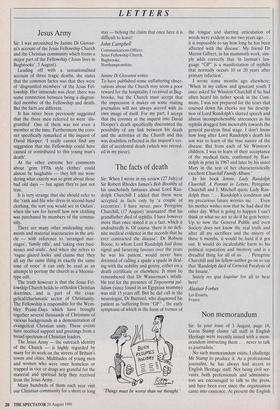The facts of death
Sir: When I wrote in my review (27 July) of Sir Robert Rhodes James's Bob Boothby of his unscholarly fantasies about Lord Ran- dolph Churchill I added that these were accepted as facts only by 'a couple of eccentrics'. I have never, pace Peregrine Churchill, (17 August) 'insinuated' that his grandfather died of syphilis. I have however more than once stated it as a fact, which it undoubtedly is. Of course 'there is no defi- nite medical evidence in the records that he ever contracted the disease'. Dr Robson Roose, to whom Lord Randolph had done signal apd farseeing favours over the years he was his patient, would never have dreamed of calling a spade a spade in deal- ing with the nobility and gentry, either on a death certificate or elsewhere. It must be remembered that Dr Wasserman's infalli- ble test for the presence of Treponema pal- lidum (since found in an Egyptian mummy) was still 15 years off. But he did call in the neurologist, Dr Buzzard, who diagnosed his patient as 'suffering from "GP " , the early symptoms of which in the form of tremor of `Things must be worse than we thought.' the tongue and slurring articulation of words were evident to me two years ago .. . it is impossible to say how long he has been affected with the disease'. My friend Dr Martin Gilbert, in his mammoth work, sim- ply adds correctly that 'in layman's lan- guage "GP" is a manifestation of syphilis that normally occurs 10 or 20 years after primary infection'.
I wrote some months ago elsewhere: `When in my callow and ignorant youth I once asked Sir Winston Churchill if he had often heard his father speak in the Com- mons, I was not prepared for the tears that coursed down his cheeks nor his descrip- tion of Lord Randolph's slurred speech and almost incomprehensible utterances as his syphilis dragged him inexorably towards the general paralysis final stage. I don't know how long after Lord Randolph's death his son was to learn of the true nature of the disease. But from each of Sir Winston's children, I was to learn of their acceptance of the medical facts, confirmed by Ran- dolph in print in 1967 and later by his sister Mary in the text of her characteristically excellent Churchill Family Album.'
In his book Jennie, Lady Randolph Churchill. A Portrait in Letters, Peregrine Churchill and J. Mitchell quote Lady Ran- dolph thus: `... Randolph's condition and my precarious future worries me .. . Even his mother wishes now that he had died the other day. What is going to happen I can't think or what we are to do if he gets better. Up to now the General Public and even Society does not know the real truth and after all my sacrifices and the misery of these 6 months, it would be hard if it got out. It would do incalculable harm to his political reputation and memory and is a dreadful thing for all of us . . .' Peregrine Churchill and his fellow-author go on to say that 'Randolph died of General Paralysis of the Insane.'
Surely res ipsa loquitur for all to hear here!
Alastair Forbes
Les Essarts, France


















































 Previous page
Previous page